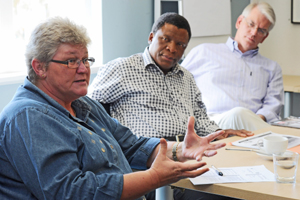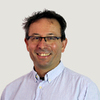Seminar highlights postgraduate teaching and African connections
08 April 2011 | Story by Newsroom Shared experiences: The speakers at the PERC seminar of postgraduate teaching in Africa were (from left) Prof Di McIntyre, Assoc Prof Mills Soko, and Prof Robert Mattes.
Shared experiences: The speakers at the PERC seminar of postgraduate teaching in Africa were (from left) Prof Di McIntyre, Assoc Prof Mills Soko, and Prof Robert Mattes.
UCT's postgraduate teaching reaches far into Africa, attracting students and engaging with continental realities. In a seminar titled Teaching Postgraduate Courses on and for Africa, a panel of three UCT academics, Professor Robert Mattes (political science), Professor Di McIntyre (public health) and Associate Professor Mills Soko (Graduate School of Business) discussed their experiences of designing and delivering master's degrees.
The seminar was organised by Professor Robert Morrell, co-ordinator of the Programme for the Enhancement of Research Capacity (PERC).
"Many UCT staff involved in postgraduate teaching have links with Africa, either through their students, in the way they construct their curricula, or through other forms of collaboration," he said. "The seminar was part of a university-wide approach to open debate on Afropolitanism and to encourage staff to orient their offerings towards the continent."
In the past six years Mattes has graduated two PhD and 24 master's students through his programme on Democratic Governance in Africa. Half of the graduates have come from continental Africa. The programme utilises a digital collection at UCT, the largest of its kind in the Southern Hemisphere. Students take at least one statistical course that enables them to mine this data base. The teaching of the master's programme meshes with Mattes' research in the Afrobarometer project, which surveys public opinion in 20 different countries.
McIntyre is the South African Research Chair in Health and Wealth and a founder of the Health Economics Unit. Since 1996 she has been running a master's course in health economics. The programme has trained 150 African health economists and 80% of the continent's health economists have graduated from her programme. She credits the success of the programme to a number of factors: strong support of the World Health Organisation (WHO), strong links between a research agenda and teaching; and a refusal to let a narrow South African perspective overwhelm continental diversity.
Soko has developed an innovative MBA course called Doing Business in Africa. His initiative was prompted by the realisation that many South African students are unaware of developments in the rest of Africa, even though South African businessmen are major players in the continent's business affairs. Starting in 2008, Soko has been attracting large numbers of students to the course. They spend one week as interns with businesses in South Africa and beyond and many are located far and wide for this week, from Zimbabwe to Uganda, and Tanzania to Rwanda.
The participants agreed that there are great benefits in shaping the learning experience of students to emphasise African conditions, highlight regional diversity and reveal the advantages of regional exchange.
 This work is licensed under a Creative Commons Attribution-NoDerivatives 4.0 International License.
This work is licensed under a Creative Commons Attribution-NoDerivatives 4.0 International License.
Please view the republishing articles page for more information.










